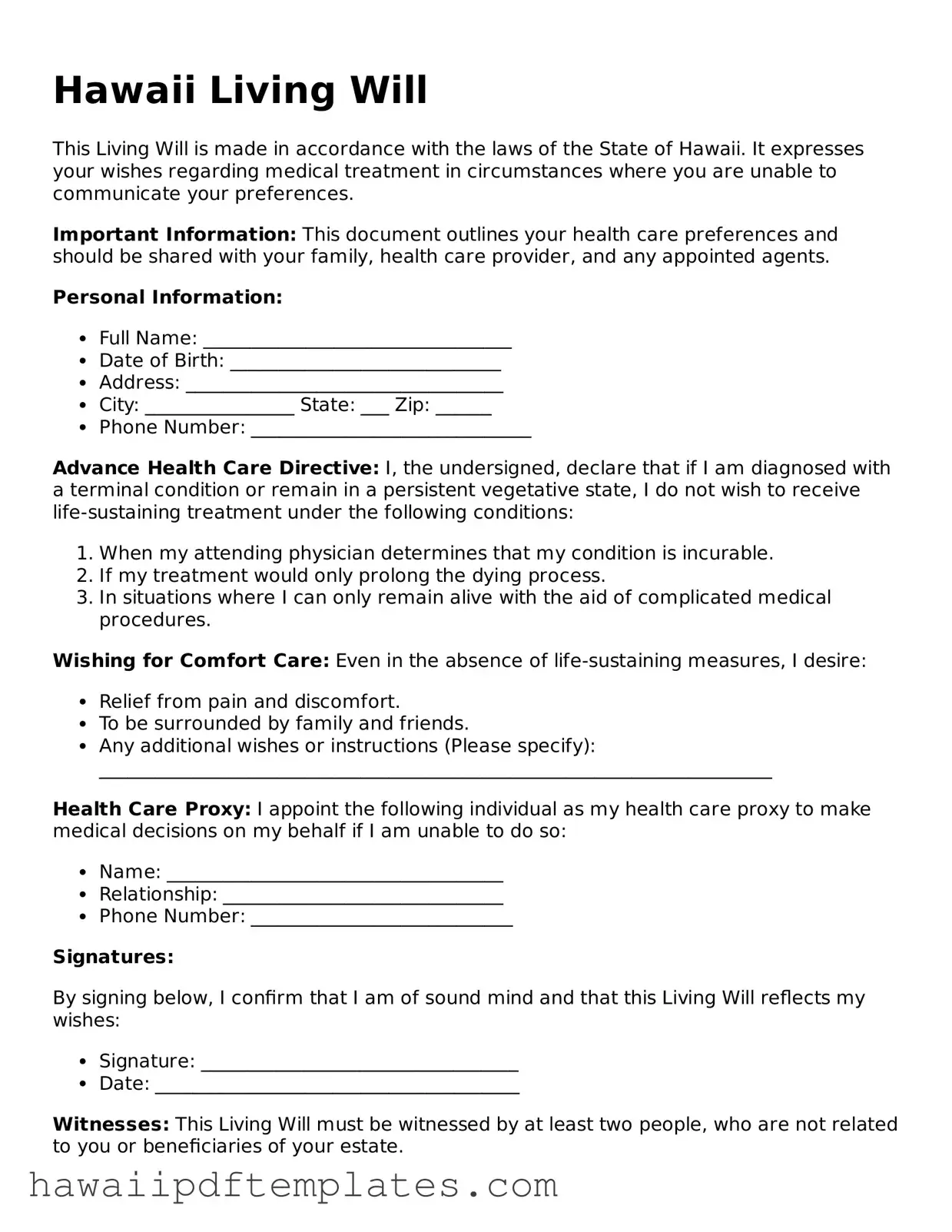Free Living Will Document for Hawaii State
Frequently Asked Questions
-
What is a Hawaii Living Will?
A Hawaii Living Will is a legal document that allows you to outline your preferences for medical treatment in case you become unable to communicate your wishes. It specifies what types of life-sustaining treatments you do or do not want, particularly at the end of life.
-
Who should have a Living Will?
Everyone over the age of 18 should consider having a Living Will. It is especially important for individuals with serious health conditions or those who want to ensure their medical preferences are known and respected.
-
How do I create a Living Will in Hawaii?
To create a Living Will in Hawaii, you can either use a template or consult with an attorney to draft one. Make sure to include your specific wishes regarding medical treatments. Once completed, you must sign the document in front of two witnesses or a notary public to make it legally binding.
-
Can I change or revoke my Living Will?
Yes, you can change or revoke your Living Will at any time. To do so, simply create a new document that clearly states your updated wishes and ensure it is signed and witnessed. Additionally, inform your healthcare providers and family members about the changes.
-
What happens if I don't have a Living Will?
If you do not have a Living Will, medical decisions may be made by your family or healthcare providers based on what they believe is in your best interest. This could lead to treatments that you might not want, as your specific wishes will not be documented.
-
Is a Living Will the same as a Durable Power of Attorney for Healthcare?
No, a Living Will and a Durable Power of Attorney for Healthcare are different documents. A Living Will specifies your wishes regarding medical treatment, while a Durable Power of Attorney designates someone to make healthcare decisions on your behalf if you are unable to do so.
-
Where should I keep my Living Will?
Store your Living Will in a safe place, but make sure that your family members and healthcare providers know where to find it. You may also want to carry a copy with you or keep it in your medical records to ensure it is readily accessible when needed.
Other Common Hawaii Forms
How to Sell a Car in Hawaii - This form can streamline future transactions involving the same motorcycle.
For anyone considering their legal options, a well-prepared document can be invaluable. The necessary Power of Attorney form empowers individuals to designate someone trusted to make decisions on their behalf, ensuring that their interests are protected in times of need.
Divorce Settlement Template - The agreement may include decisions regarding debt responsibilities.
Steps to Writing Hawaii Living Will
Filling out the Hawaii Living Will form is an important step in planning for your future healthcare decisions. By completing this form, you can express your wishes regarding medical treatment in case you become unable to communicate those wishes yourself. Follow the steps below to ensure that your form is filled out correctly.
- Obtain the Hawaii Living Will form. You can find it online or request a copy from a legal office.
- Read through the entire form carefully. Familiarize yourself with the sections and what information is required.
- Begin by filling out your personal information. This includes your full name, address, and date of birth.
- Identify your healthcare agent, if you have one. Provide their name and contact information. If you do not have an agent, you can skip this step.
- Clearly state your wishes regarding medical treatment. Use simple language to describe the types of treatments you want or do not want.
- Review the completed form for accuracy. Make sure all information is correct and clearly written.
- Sign and date the form in the designated area. Your signature is essential for the form to be valid.
- Have the form witnessed. Two witnesses must sign the document, confirming that you were of sound mind when you signed it.
- Keep copies of the completed form. Store them in a safe place and provide copies to your healthcare agent and family members.
Misconceptions
Many people have misunderstandings about the Hawaii Living Will form. Clarifying these misconceptions can help individuals make informed decisions about their end-of-life care. Here are four common misconceptions:
- A Living Will is the same as a Last Will and Testament. This is not true. A Living Will specifically addresses healthcare decisions and preferences regarding medical treatment, while a Last Will and Testament deals with the distribution of a person's assets after death.
- A Living Will is only for the elderly or terminally ill. Many believe that only those facing imminent death need a Living Will. In reality, anyone over the age of 18 can benefit from having one, as unexpected medical emergencies can happen at any age.
- A Living Will is legally binding in all states. While Living Wills are recognized in many states, the rules can vary. It’s essential to ensure that your Living Will complies with Hawaii’s specific laws to be enforceable.
- Once a Living Will is created, it cannot be changed. This is a misconception. Individuals can revise or revoke their Living Will at any time, as long as they are mentally competent to do so. Regularly reviewing your preferences is advisable.
Understanding these points can empower individuals to take control of their healthcare decisions and ensure their wishes are honored. Always consult with a legal professional for personalized advice and guidance regarding Living Wills.
